India’s first Flip Conference that intends to establish academia for Change Agents, which facilitate Research, Report Writing and an Ecosystem that will equip our Change Agents with the knowledge and tools needed to survive and thrive in an ever-changing landscape.
2019 CAS is planned to happen in Bangalore, India on 13 Oct 2019. Agenda for this Summit continues to: evaluate “State of Agile Transformation in Indian Subcontinent”.
Lean Agile Change Agents are responsible for bringing in needed change in ecosystem and solve problems that emerge in the path of transformation. But where do Change Agents find solution for their own problem? Is there an ecosystem that enables change agents to do their job effectively and efficiently? Where are they heading, and where do they see themselves in the next 2 - 5 years? How will they grow as leaders and professionals when Agile wave fizzle out. From where to get help. How to share their experiences so that others can learn from their mistakes, and do not feel helpless. How to go beyond Scrum and other Agile Frameworks to achieve holistic and indigenous Transformation that results in Business Agility.
With this initiative, we intend to create a movement that enables Lean Change Agent of india, do right job right, and bring in needed Culturatural and Business Transformation.
Every Summit will have it’s own focus area. Our first Summit, held on 7 Oct, 2018, under thought Leadership of Tathagat Verma, was focused on helping Lean Agile Change Agents in India do right job. To achieve it, we broke down Agenda in 3 parts:
We are focusing primarily on Agile Coaching and Consulting here, because they have become the face of Change Agents since Agile revolution. But majority is still limited to Scrum Coaching, and for some or the other reason they are not reaching to the level of Business Agile Coaching/Consulting. And to think of any improvement, we first need to do assessment of current state.
When we know where we are, the next step will be to see how we can take us to next level, and for that we need an ecosystem to support, nurture and take Indian Lean-Agile Change Agents to next level, so that they can do right and needed job, and not just stay ScrumMasters and Trainers.
For sure we all can still help each other with the abundance we have. You may have two jobs in hand, out of which you might want to give away one, and I may be in dire need of that one. So, let’s connect in such a way that we can share, create and multiply our opportunities. This part of summit is specially designed such that an intentional networking can happen.
30 Change Agents who fell in on of the following categories:
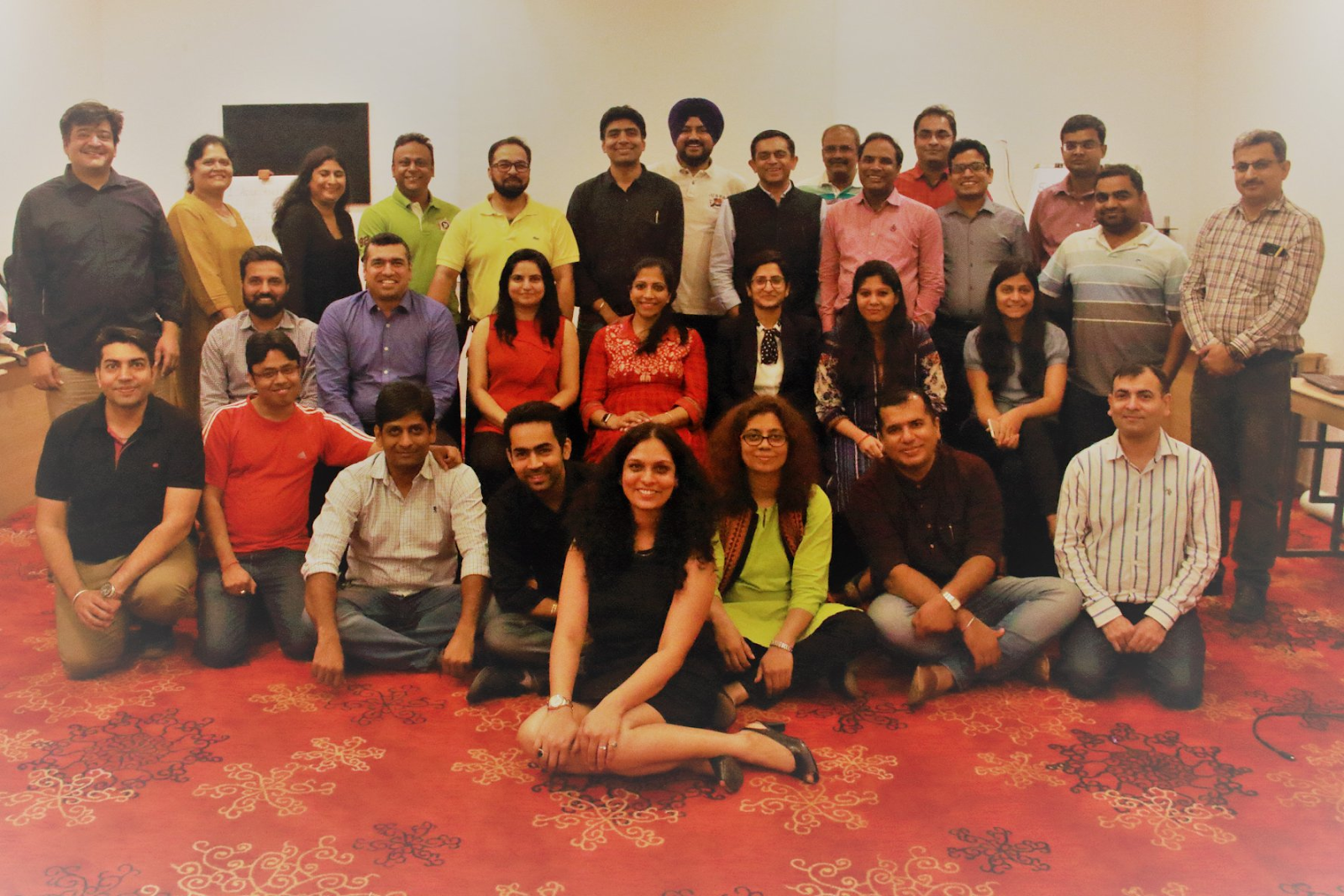 Top Row, L-R: Abhishek Vatsyayan, Nagini Chandramouli, Purabi Misra, Sumeet Aggarwal, Sandeep Sinha, Manish Sachdeva, Vikramjit Singh, Tathagat Verma, Srinath Ramakrishnan, Vivek Garg, Siddharth Shukla, Mahaveer Bhamasha, Subodh Kumar, Pradeep Kumar, Saurabh Sharma
Top Row, L-R: Abhishek Vatsyayan, Nagini Chandramouli, Purabi Misra, Sumeet Aggarwal, Sandeep Sinha, Manish Sachdeva, Vikramjit Singh, Tathagat Verma, Srinath Ramakrishnan, Vivek Garg, Siddharth Shukla, Mahaveer Bhamasha, Subodh Kumar, Pradeep Kumar, Saurabh SharmaOn 7 Oct 2018, 30 lean agile change agents got together to share their experiences about Agile Transformation attempts their organisations or clients made, distance they covered; and failure and success factors. As mentioned previously, the conference was first Flipped Agile Conference in India where we only provided the loose structure but content and conversations from participants were used to share the ideas and learn from each other.

1. Context Setting:
Summit started under Tathagat Varma’s thought leadership. He explained Change Agents the intention of Summit and how it could be executed. 4 Change Agents were requested to volunteer for facilitation of 4 sub-sessions around different stages of Transformation progression.
2. Day Flow:
Day was divided in 4 parts, loosely based on 4 major Transformation Phases (detailed out later in this report) in an approximate chronological but logical manner:
3. Session Facilitation:
4 Change Agents volunteered to facilitate each session. Tathagat Varma shepherded them for the same.
Each session was facilitated on a guiding template as below:
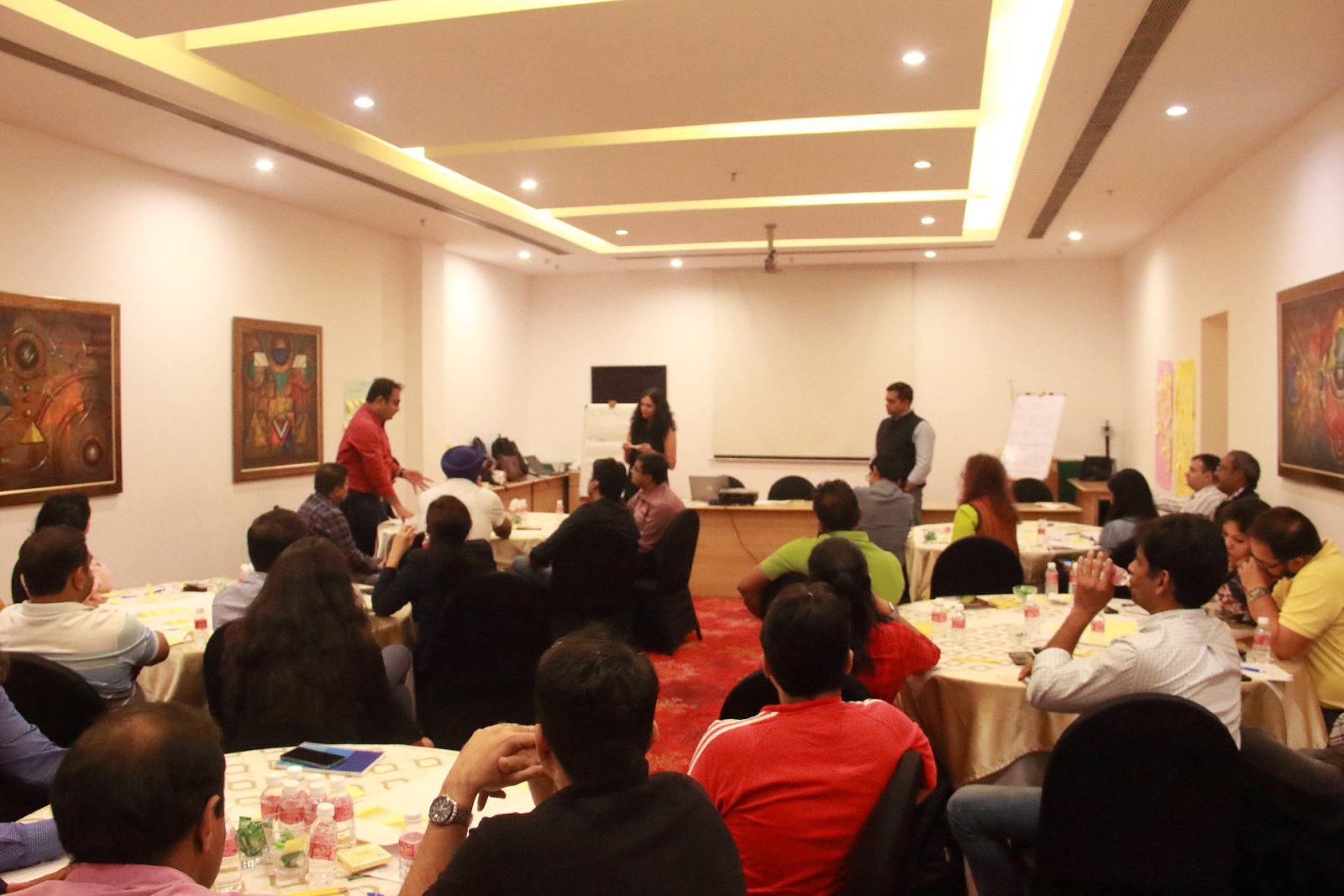
a. Set Objective (5 min):
Facilitator introduces the topic and explains the objective. This helped creating guardrails around the main theme of each session lest the participants veer off tangentially, which is a real possibility in an open-ended session such as this.
b. Brain Writing (15 min):
Individuals on each table lists “Key Challenges” and “Success factors” for the current Transformation Phase. As opposed to the generally followed practice of brainstorming where the conversations typically get hijacked by a smaller number of more dominant participants, and a few topics end up getting monopolized, brainwriting ensures that initial idea generation is much more democratic, both in terms of individuals contributing to the session and the ideas that are being generated.
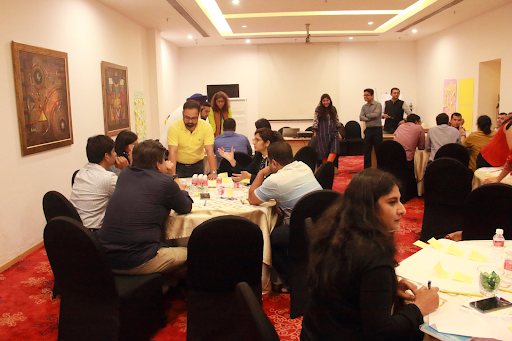
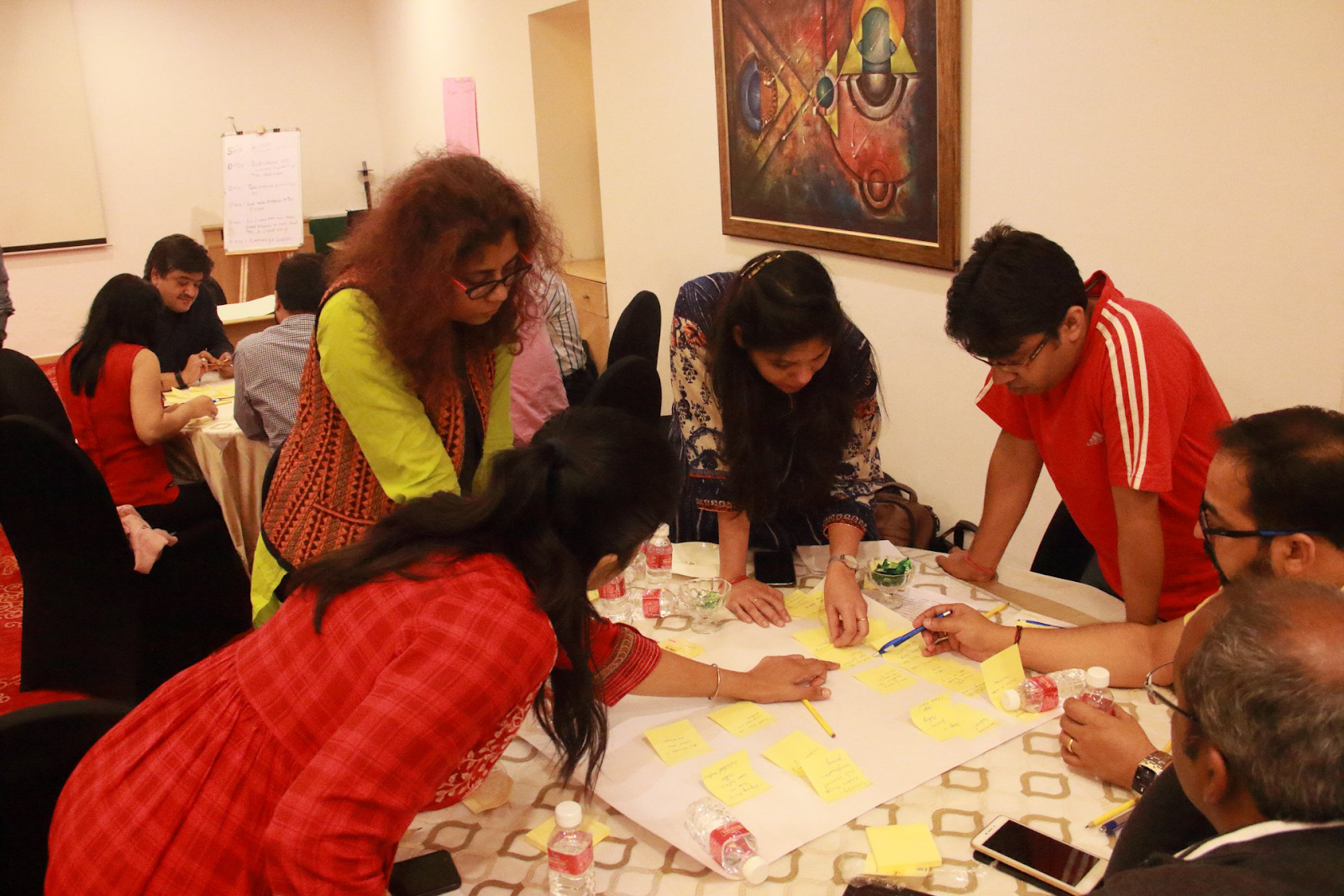
c. Brainstorming and Prioritisation (10min):
After the brainwriting session, each table gets ~8-10 ideas per participants, so there could be upwards of 50+ ideas on a single table alone. While not all of them might be most relevant, practical or relatively-important, it helps capture the entire spectrum for a more thorough analysis. The next step is brainstorming where each table (4-5 participants) discusses and prioritizes the list for their table.
d. Present top ideas (10min):
Each table chooses a member (by rotation) to present its Top 4-5 ideas (2 min each), with any other member pitching-in in case more clarity was required. This allowed ideas to be represented as best as possible with minimum chances of errors of translation or understanding.
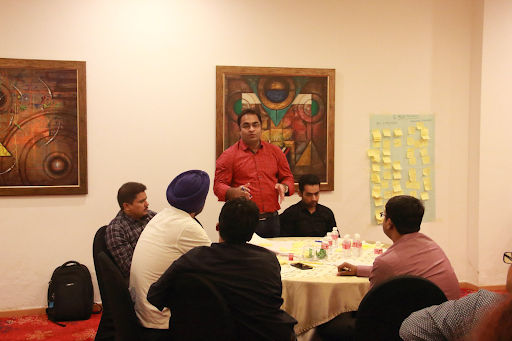
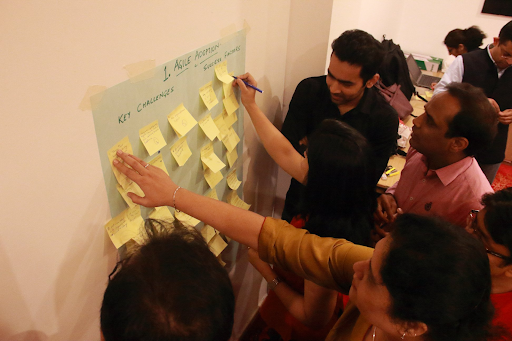
e. Collating ideas from everyone (15min):The post-it notes from all tables are sorted and consolidated on wall charts and archived. Everyone does silent voting on Top 3 issues.
f. Summarise (5 min)
Facilitator summaries the key outcomes of the session
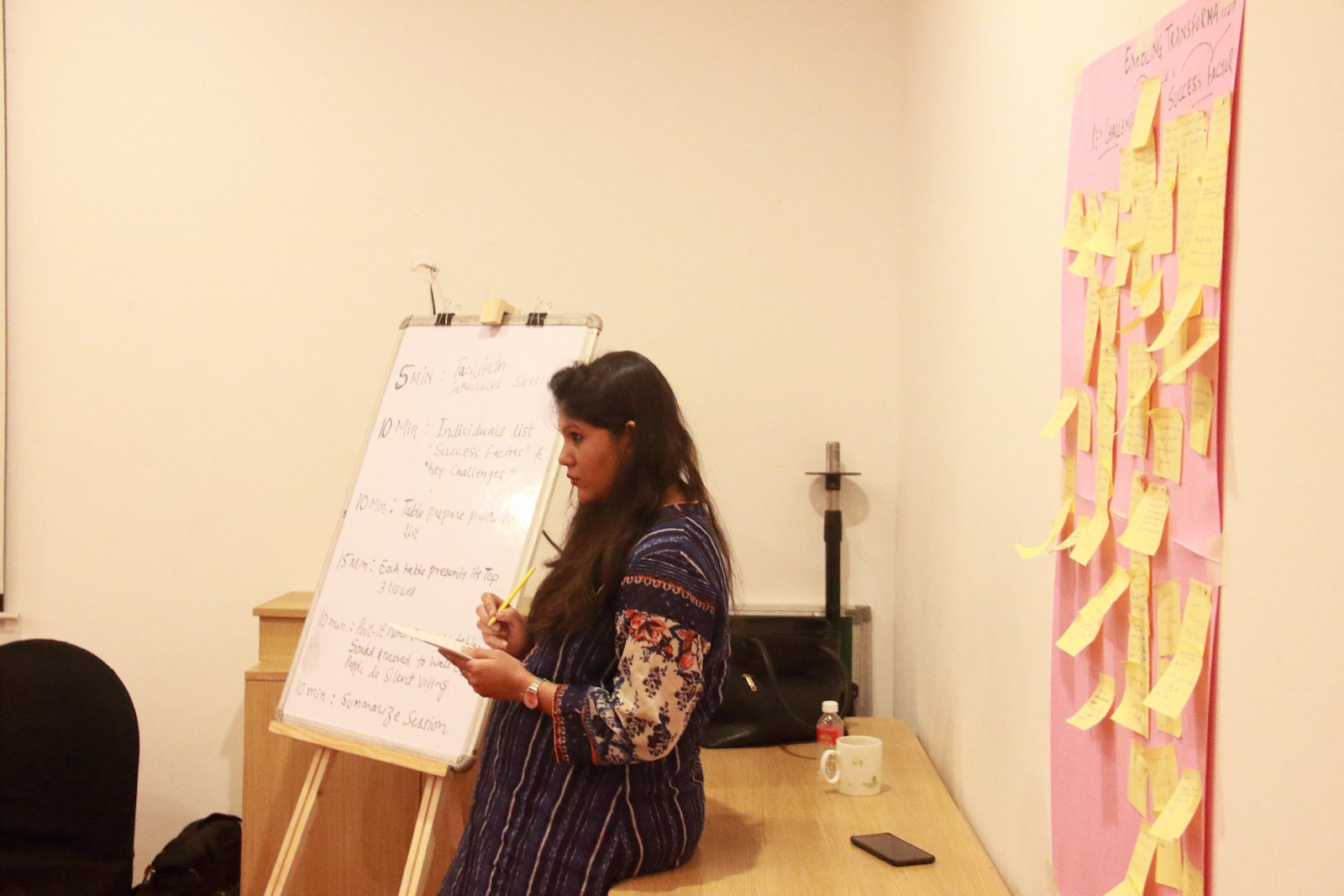
We gathered data for “State of Agile Transformation in Indian Subcontinent” and condensed it in a report. The report is further shepherded by "Agile Alliance, and is now available for wider audience. We will continue working on this report every year. Hope you can join us in coming years, and we can help organisational Leader with this report, to create a truly Agile Organisation, which not just focuses on IT & Software Agility, but also achieves Business Agility.